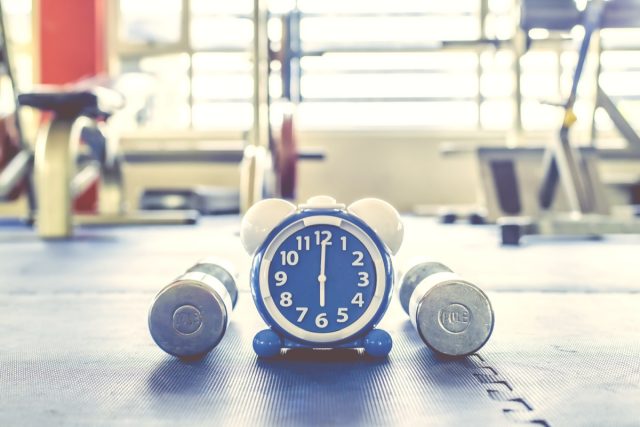The Best Time of Day to Exercise If You Want to Lose Fat

Whether it's morning, midday, or evening, everyone has their ideal workout time. Some people swear by morning workouts, while others find that evening is when they hit their stride. But what does the science say about the best time of day to exercise for fat loss? Is there one optimal time to work out, or does it depend on the person?
We chatted with certified personal trainers about how different times of day can impact fat burning, and whether it's the timing or other factors that make the biggest difference. While there's no one-size-fits-all answer, research suggests the timing of your workout can affect your performance, metabolism, and fat oxidation. But the truth is, consistency, intensity, and dedication matter far more than whether you choose to work out at the crack of dawn or after sunset.
In this article, we'll break down the science behind the best time of day for fat loss and share expert insights on how to make your workouts work for you—whenever you're ready to exercise.
(Next up: Check out The Only 4 Exercises You Need for Total-Body Fitness.)
Rise and Shine! Morning Workouts Can Help with Fat Loss

Waking up early to exercise has long been touted as an excellent way to kickstart fat loss. But does working out first thing really give you an edge when it comes to burning fat?
Nicole Davis, CPT, a certified personal trainer and nutrition coach at Garage Gym Reviews, tells ETNT, "Morning fasted workouts may slightly speed up fat oxidation because glycogen stores are lower after not eating throughout the night. This means your body may rely on stored fat as fuel when glycogen is low, potentially making fat-burning more efficient."
However, the key takeaway here is that morning workouts are effective for fat loss if they fit into your routine. Stephen Sheehan, CPT, a certified personal trainer at BarBend, explains, "The best time of day for fat loss workouts is whenever you can be the most consistent."
So, if you're naturally an early riser and feel energized in the mornings, a workout at this time could be ideal. But, if you find that morning exercise disrupts your day or lowers your performance, evening workouts might be just as effective.
Exercising Later in the Day Can Boost Performance and Burn Calories

For those who struggle to wake up early, evening workouts may be the answer. Studies have found that your body temperature, muscle function, and grip strength are typically higher later in the day, which can help improve your performance and, in turn, increase calorie burn.
"Evening workouts can be more effective for performance and strength training because your body temperature and muscle function are usually higher later in the day," Davis explains. "With improved muscle function, you're more likely to push yourself during a workout, leading to greater calorie burn."
Moreover, Sheehan adds that evening workouts can help "release stress built up throughout the day," helping you to unwind while still burning fat. If you're someone who finds that evening exercise boosts your performance and helps with stress, it could be an excellent option for weight loss.
However, it's important to note that research generally recommends avoiding high-intensity exercise before bed as it can disrupt sleep. Instead, opt for moderate-intensity exercise in the evening so you can still get a restful night of sleep.
How Does Exercise Timing Impact Metabolism?

While morning workouts are better when it comes to fat oxidation, a 2022 study published in Obesity found that evening workouts can still be effective for fat loss. So what matters most: timing, intensity, or the duration of your workouts?
"The difference in metabolism between morning and evening training is minimal compared to factors like intensity, duration, and frequency," Sheehan explains. "Essentially, it's the effort you put into your workout that will have the greatest impact on fat loss, not necessarily the time of day."
Davis agrees, noting that "total calorie burn and fat loss are more about intensity and duration than timing during the day." The real takeaway here is that no matter what time you choose to work out, working out with enough intensity and for a sufficient amount of time is what will move the needle on fat loss.
Other Factors Affecting Fat Loss

According to a 2021 review in Nutrients, your hormones are one of the biggest driving forces behind the effectiveness of workouts at different times of the day. But how big of a role do they play in fat loss?
Cortisol and testosterone levels tend to be higher in the morning, which could provide a slight advantage for fat loss and building muscle. "Cortisol helps with energy, which may help with burning fat during morning exercise," Davis explains. "However, the growth hormone released after an intense workout, which aids in muscle repair and metabolism, may be better used with evening workouts."
Despite these fluctuations, Davis clarifies that "hormonal differences matter, but they're not a dealbreaker when it comes to fat loss." Whether you're working out in the morning or evening, the National Institutes of Health says regular exercise and maintaining a calorie deficit are far more crucial factors for weight loss.
Exercise Consistency Is Most Important

So, is there a magic time of day to burn fat? Not exactly. What matters is finding a time that works for you and sticking with it.
"The best time of day for fat loss workouts is whenever you can be the most consistent," says Sheehan. "If you're someone who thrives in the morning and can stick to a routine, then morning workouts may be perfect for you. On the other hand, if you're more energized at night, evening sessions could be a better fit."
Ultimately, your best time to work out is the time that fits your lifestyle and keeps you consistent with your routine. Whichever time you choose, make sure to combine your workouts with a balanced diet and enough intensity to see the best results. As always, speak with your healthcare provider before starting any new exercise routine.









